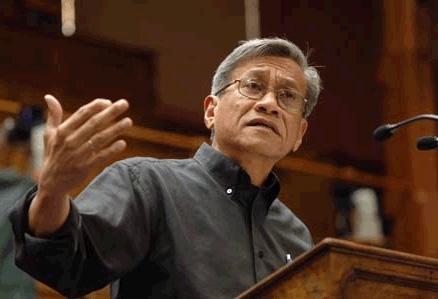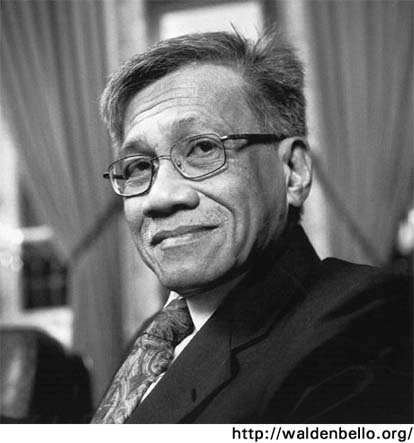Date: Friday, 24 April 2009
From: akbayanmedia@gmail.com

Walden Bello, senior analyst of Focus on the Global South and professor of sociology at the University of the Philippines, is one of the leading critics of the current model of economic globalisation, combining the roles of intellectual and activist. As a human rights and peace campaigner, academic, environmentalist and journalist, and through a combination of courage as a dissident, with an extraordinary breadth of published output and personal charisma, he has made a major contribution to the international case against corporate–driven globalisation.
Bello was born in Manila in the Philippines in 1945. He was studying in Princeton for a sociology Ph.D in 1972 when Ferdinand Marcos took power, and plunged into political activism, collecting his Ph.D, but not returning to the university for another 20 years. Over the next two decades, he became a key figure in the international movement to restore democracy in the Philippines, co–ordinating the Anti–Martial Law Coalition and establishing the Philippines Human Rights Lobby in Washington.
He was arrested repeatedly and finally jailed by the US authorities in 1978 for leading the non–violent takeover of the Philippine consulate in San Francisco. He was released three weeks later after a hunger strike to publicise human rights abuses in his home country.
While campaigning on human rights he saw how the World Bank and IMF loans and grants were supporting the Marcos regime in power. To expose their role, he took the risk of breaking into the World Bank headquarters in Washington, and brought out 3,000 pages of confidential documents. These provided the material for his book Development Debacle: the World Bank in the Philippines (1982), which became an underground bestseller in the Philippines and contributed to expanding the citizen’s movement that eventually deposed Marcos in 1986.
After the fall of Marcos, Bello joined the NGO Food First in the USA, and began to expand his coverage of the Bretton Woods institutions, in particular studying the ‘newly industrialised countries’ of Asia. His critique of the Asian economic ‘miracle’, Dragons in Distress, was written six years before the financial collapse that swept through the region.
His recent work has been criticising the financial subjugation of developing countries and promoting alternative models of development that would make countries less dependent on foreign capital.
In 1995, he was co–founder of Focus on the Global South, of which he later became executive director. Focus seeks to build grassroots capacity to tackle wider regional issues of development and capital flows. When the Asian Financial Crisis struck two years later, Focus played a major role advocating a different way forward.
Bello argues that “what developing countries and international civil society should aim at is not to reform the WTO but, through a combination of passive and active measures, to radically reduce its power and make it simply another international institution co–existing with and being checked by other international organisations, agreements and regional groupings. It is in such a more fluid, less structured, more pluralistic world with multiple checks and balances that the nations and communities of the South will be able to carve out the space to develop based on their values, their rhythms, and the strategies of their choice.”
At the abortive WTO meeting in Seattle in 1999, Bello played a leading role in the teach–ins around the protest events and was later beaten up by the Seattle police. He was detained again by the Italian police and nearly run over by a police car at the 2001 G–8 summit in Genoa. He also played a key role in civil society circles in elaborating the strategy to derail the WTO Ministerials in Cancun in September 2003 and in Hong Kong in December 2005.
In September 2006, he was banned by the Singapore government from entering the island state to attend the World Bank–IMF annual meeting, a repressive act that was criticized by World Bank President Paul Wolfowitz himself.
He has also played a leading role as an environmentalist, and is former chairman of the board of Greenpeace Southeast Asia. His 1998 book A Siamese Tragedy, documenting the environmental destruction of Thailand, became a bestseller there and won praise from former Thai Prime Minister Anand Oanyarachun. It received the Chancellor’s Award for best book from the University of the Philippines in 2000.
Bello has campaigned for years for the withdrawal of US military bases in the Philippines, Okinawa and Korea, and has helped set up several regional coalitions dedicated to denuclearisation and demilitarisation, and a new kind of security plan based on meeting people’s needs.
After September 11, 2001, he was a leading voice from the South urging the USA not to resort to military intervention — which he believed would exacerbate the problem — but to tackle the root causes of terrorism in poverty, inequality, injustice and oppression. In March 2002, he led the peace mission to the southern Philippine island of Basilan, where the US army recently sent their special forces. He was also one of the leaders of a peace mission of Asian parliamentarians and civil society activists that visited Baghdad in March 2003 in a last–ditch effort to stop the US invasion of Iraq. He led another mission to Lebanon at the height of the Israeli bombing and invasion of that country in August 2006.

Bello was awarded South Korea’s Suh Sang Don Prize in 2001. In 2003, he was given the Right Livelihood Award, also known as the Alternative Nobel Prize, for “... outstanding efforts in educating civil society about the effects of corporate globalisation, and how alternatives to it can be implemented.” The Belgian newspaper Le Soir called Bello “the most respected anti–globalisation thinker in Asia.” Canadian author Naomi Klein has called him the “world’s leading no–nonsense revolutionary.” Chalmers Johnson has hailed him as the “world’s best guide to American exploitation of the globe’s poor and defenceless.”
An academic as well as an activist, Bello obtained his PhD in sociology from Princeton University in the US in 1975 and has been a full professor at the University of the Philippines at Diliman since 1997. He has also served as visiting professor at the University of California at Los Angeles (2002), UC Irvine (2006), and UC Santa Barbara (2006). He also taught for four years, 1978–82, at UC Berkeley. He was Chancellor’s Fellow at UC Irvine in 2004 and was awarded an honorary PhD by Panteion University in Athens, Greece, in 2005.
 Home | Aims and Objectives of Solidarity Philippines Australia Network | About Kasama
Home | Aims and Objectives of Solidarity Philippines Australia Network | About Kasama 
Search the SPAN Web